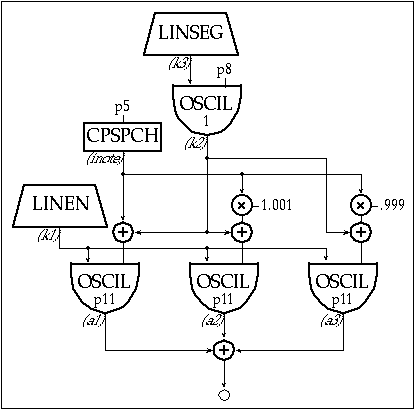
Toot 6: GENs
The first character in a score statement is an opcode, determining an action request; the remaining data consists of numeric parameter fields (p-fields) to be used by that action. So far we have been dealing with two different opcodes in our score: f and i. i statements, or note statements, invoke the p1 instrument at time p2 and turn it off after p3 seconds; all remaining p-fields are passed to the instrument.
On the other hand, f statements, or lines with an opcode of f, invoke function-drawing subroutines called GENS. In Csound there are currently twenty-three GEN routines which fill wavetables in a variety of ways. For example, GEN01 transfers data from a soundfile; GEN07 allows you to construct functions from segments of straight lines; and GEN10, which we've been using in our scores so far, generates composite waveforms made up of a weighted sum of simple sinusoids. We have named the function "f1," invoked it at time 0, defined it to contain 512 points, and instructed GEN10 to fill that wavetable with a single sinusoid whose amplitude is 1. GEN10 can in fact be used to approximate a variety of other waveforms, as illustrated by the following:
f1
0
2048
10
1
; Sine
f2
0
2048
10
1
.5
.3
.25
.2
.167
.14
.125
.111
; Sawtooth
f3
0
2048
10
1
0
.3
0
.2
0
.14
0
.111
; Square
f4
0
2048
10
1
1
1
1
.7
.5
.3
.1
; Pulse
For the opcode f, the first four p-fields are interpreted as follows:
p1 - table number - In the orchestra, you reference this table by its number.
p2 - creation time - The time at which the function is generated.
p3 - table size - Number of points in table - must be a power of 2, or that plus 1.
p4 - generating subroutine - Which of the 17 GENS will you employ.
p5 - meaning determined by the particular GEN subroutine.
In the instrument and score below, we have added three additional functions to the score, and modified the orchestra so that the instrument can call them via p11.
instr 6
; toot6.orc
ifunc
=
p11
; select basic waveform
irel
=
.01
; set vibrato release
idel1
=
p3 * p10
; calculate initial delay
isus
=
p3 - (idel1 + irel)
; calculate remaining dur
iamp
=
ampdb(p4)
iscale
=
iamp * .333
; p4=amp
inote
=
cpspch(p5)
; p5=freq
k3
linseg
0, idel1, p9, isus, p9, irel, 0
; p6=attack time
k2
oscil
k3, p8, 1
; p7=release time
k1
linen
iscale, p6, p3, p7
; p8=vib rate
a3
oscil
k1, inote*.999+k2, ifunc
; p9=vib depth
a2
oscil
k1, inote*1.001+k2, ifunc
; p10=vib delay (0-1)
a1
oscil
k1, inote+k2, ifunc
out
a1+a2+a3
endin
; toot6
f1
0
2048
10
1
; Sine
f2
0
2048
10
1
.5
.3
.25
.2
.167
.14
.125
.111
; Sawtooth
f3
0
2048
10
1
0
.3
0
.2
0
.14
0
.111
; Square
f4
0
2048
10
1
1
1
1
.7
.5
.3
.1
; Pulse
;ins
strt
dur
amp
frq
atk
rel
vibrt
vibdpth
vibdel
waveform(f)
i6
0
2
86
8.00
.03
.7
6
9
.8
1
i6
3
2
86
8.02
.03
.7
6
9
.8
2
i6
6
2
86
8.04
.03
.7
6
9
.8
3
i6
9
3
86
8.05
.03
.7
6
9
.8
4
e

Toot 6: GENs
![]()